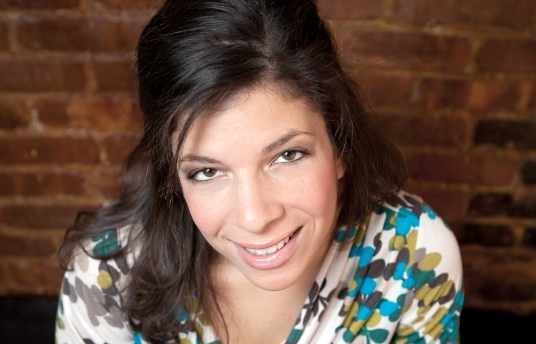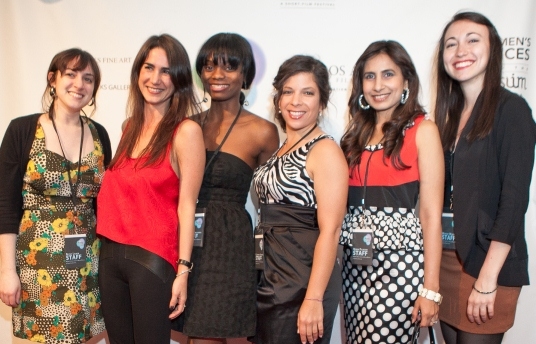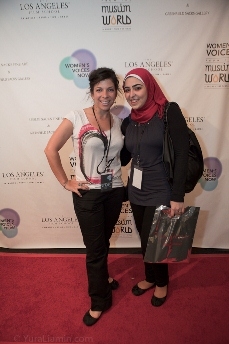People In Film: Cassandra Schaffa
Apr 03, 2011

Cassandra Schaffa is a graduate of New York University’s Cinema Studies Masters program. While attending NYU, Cassandra was awestruck by films highlighting the challenges faced by women around the globe, and was inspired by the strength of these women to build a better future. Cassandra firmly believes that women are the key to social change and she hopes to use film as an essential tool to further the progress that has already been made. Cassandra also holds a Bachelor of Arts degree in Broadcast Communication and Spanish from Flagler College in St. Augustine, FL and is an avid Ultimate Frisbee player. She currently resides in New York City.
DFI: What is your name, and where are you from?
Cassandra: My name is Cassandra Schaffa. I was born in the Bronx, NY and spent the first half of my childhood in Mt. Kisco, NY before moving to Florida. I moved back to NYC about 4 years ago.
DFI: Where do you currently work, and what is your job title? Can you give us a brief description of what you do?
Cassandra: I am currently the Director of Festival Operations at Women’s Voices Now (WVN), a non-profit organisation started in January 2010. I was brought into this organisation to help the non-profit and specifically their first project: ‘Women’s Voices from the Muslim World: A Short-Film Festival’.
DFI: How long have you worked in this field, and can you tell us how you got involved in it?
Cassandra: I have been deeply involved in the world of film and television since my very first TV production class in 6th grade. I have a love for all sides of the industry, from production to what I like to call appreciation. Appreciation is the word I started using to describe the industry of bringing film and television to the audience. In college I worked at a movie theatre and a video rental store and took great pride in being able to recommend material to our customers.
My interest in the aesthetics, psychology and history of film led me to NYU’s Cinema Studies MA program. In my final semester at NYU I took a class called Documentary Traditions with documentary filmmaker George Stoney (who was, I think, 97 years old at the time!). This class opened my eyes not only to the power of film to incite social change by documenting a problem, condition, or situation in order to encourage audiences to make change, but the power of filmmaking itself as a tool to improve one’s own condition. In particular, I would cite the documentary ‘Where the Water Meets the Sky’. The film focuses on an organisation that teaches women in Zambia how to make a movie and then asks them to make a short documentary about some condition in their community that needs improvement. Not only were the men in the community shocked to find out how capable their wives are, but the women opened the eyes of their community to the conditions that were facing children orphaned by HIV/AIDS. I completed my Masters at NYU with the dream of using film in a capacity to improve the world, and literally stumbled upon a job listing on Craiglist for an organisation that was creating a film festival focused on women of the Muslim world.
DFI: As the Festival Director of ‘Women’s Voices from the Muslim World: A Short-Film Festival’ can you tell us a little about the festival?
Cassandra: The Festival, which focuses on women of all faiths living in Muslim majority countries, and Muslim women living as minorities around the world, was developed with the intention of not only bringing to light the atrocities that some women are facing in the Muslim world, but to also highlight the amazing work towards advancing women’s rights that is being done by the women themselves. We wanted to provide a new medium wherein the women that were living in these countries were speaking directly to an international audience. Too often we rely on traditional media sources that are heavily filtered and slanted. Biases and incomplete information have certainly led to a skewed view of these women and, judging by the overwhelming response, these women were ready to be heard by the world. The Festival received over 200 short-film submissions from 40 countries. An official selection of 98 films were made available online (www.womensvoicesnow.org/watch) and have been watched, rated and commented upon in over 160 countries. These documentary, fiction, student and experimental films were made by both men and women, and both professional and amateur filmmakers. On March 17-19, 2011, we held the physical Festival at the Los Angeles Film School in California. The event included 3 days of screenings, parties, and various other events. Every screening was curated according to a certain topic and was followed by a panel discussion with filmmakers and experts on the subjects addressed in the films.
DFI: Who has been involved in the festival, and what inspired you to do this project?
Cassandra: The Film Festival and the organisation itself was the vision of our founder, Leslie Sacks. Leslie sees women as a source for peace and stability and feels they have the ability to make the greatest strides in improving their societies. He believes, as do all of us at WVN, that improved conditions for women and greater involvement in politics and decision making will lead to a freer and more just society in any country in the world. Leslie brought on our Executive Director, Catinca Tabacaru, a former human rights lawyer, to spearhead the project, who then assembled a small team of volunteers and interns. Myself and our Director of Development, Miriam Wakim, were some of the first to join the team and have had many amazing volunteers help us reach our goal along the way: in particular, our project managers Betsy Laikin, Mona Pajwani, Oluchi Enemanna and Amanda Kimia.

(L-R) The WVN team: Betsy Laikin, Catinca Tabacaru, Oluchi Enemanna, Cassandra Schaffa, Mona Pajwani, and Miriam Wakim
DFI: How would you describe WVN, and what benefits does it reflect in the community, especially in the women’s environment?
Cassandra: WVN is a marriage between art and women’s rights. Artists have always been at the forefront of social change. It is the forward thinking and liberal artists who often seek a just and equal world. In particular, film is a relatively new art form that is proving to be a unique and powerful tool in all social movements. With smaller, cheaper cameras and affordable and user-friendly equipment, artists and citizen journalists alike are able to hold their governments accountable for injustices, as well as reach out to the world to share their experiences. And I’m not just talking negative experiences, but all the great advances in women’s rights taking place all around the world. There are many countries, in particular within the Muslim world, where some of the greatest work is being done to advance the state of women and it is very rare that this kind of information is disbursed through mainstream media. In addition, WVN’s online presence contributes to the global dialogue about these issues. It is clear what a huge role Facebook played during the revolution in Egypt, and it is social networks like Facebook, Twitter, YouTube and Vimeo that have truly expanded the reach of WVN’s work. The films on our website have been viewed in over 160 counties. The comments on our films and our Facebook wall are in dozens of languages. This is the kind of dialogue that needs to be happening – not battles behind closed doors in small courtrooms, but a global movement where anyone at any socioeconomic level can contribute a voice.
DFI: Why have you chosen to talk about and empower women?
Cassandra: I truly believe that improving conditions for women improves society as a whole. To empower women is to tap into one of the world’s greatest human resources. As I’ve heard said a million times, and as I completely agree with, no country can reach its full potential if it excludes 50% of its population. I also believe that when given the opportunity, women are more likely to make peaceful and just decisions and spend money in ways that ensure proper care, safety and education for their children. I am by no means saying that men are incapable of making these kinds of decisions, but more often than not a woman will put health, home and family first.
DFI: What other aspects of film are you involved in, if any, and can you tell us a little about it?
Cassandra: Currently I have no other projects lined up, but I am always looking for new ways to apply my talents and passion. I’m actually very involved in the sport of Ultimate Frisbee and am always brainstorming with my friends and teammates about using film or television to bring the sport into the mainstream. We might be on the verge of the next big sports reality show. Haha.
DFI: What does filmmaking mean to you?
Cassandra: Filmmaking, like any art, is a universal language. I actually really miss silent film. I guess I can’t miss it, since I wasn’t alive then, but I love the idea of telling a story strictly with visual elements. I recently went to a Halloween screening of ‘Nosferatu’ with live organ accompaniment, and was shocked to see the little historical theatre I was at filled to capacity. You don’t have to speak the same language to understand emotion and I am so glad to see many “silent” films in our Fiction and Experimental categories. It’s one thing to watch a documentary like ‘Beyond Belief’, about how widows in Afghanistan suffer the way 9/11 widows suffer and read the subtitles that tell me this, but it’s a whole other level of art and language to express poverty, loss and compassion as a universal experience without speaking one word as in ‘We Are Postmodern’. But whether a film is silent or translated by subtitles, it’s a means of giving voice, expressing oneself, and reaching out to the world, and has been a way for me to express myself and share my experiences with those around me.
DFI: How do you think filmmaking has developed since you started in the business? What have these developments meant to you, and to the role you play?
Cassandra: I think one of the greatest developments in filmmaking since I first started is accessibility. Just about anyone can be a filmmaker now with affordable and user-friendly equipment. I’ll admit I miss that feeling of exclusivity I had when I was making films at 15 years old. I was doing something that the majority of the population had no idea how to do. Now every computer comes standard with some kind of video editing software. I just had a flashback to tape to tape linear editing for my middle school morning announcements show. Another amazing development, and this goes beyond just filmmaking, is the whole social networking movement. Our information is no longer filtered by governments or traditional news sources, but direct from citizen journalist to audiences. This was something we really wanted to capture with the Festival: the concept of getting stories and information directly from the women involved, to circumnavigate traditional and filtered media.
DFI: Can you tell us your thoughts on the future of filmmaking in the Arab world, and what you think is coming next?
Cassandra: As I mentioned earlier, we received over 200 submissions to our Festival, and yes, I watched every single one, and every single one absolutely impressed me. There is a superb level of artistic talent in the Arab world and a wonderful grasp for the art of storytelling. I have no doubts that in the next 10 years we’ll be seeing some mainstream blockbuster hits coming out of the Arab world.

Cassandra Schaffa with Qatar Student Filmmaker Thouria Mahmoud
DFI: What is the message you’d like to give to prospective young filmmakers out there, or to anyone who would like to follow in your footsteps?
Cassandra: Be original and be prepared to get your butt kicked for it. When I first graduated college, I interviewed with someone who told me we worked in a “privileged” industry. Everyone wants the glamour but to get there you’re expected to work for free and to give in to the mainstream. It was a fact that I had a hard time accepting until I fell into something that truly aligned with my passions. I guess I’m one of those people who would rather be broke and doing things my way than miserable and doing things someone else’s way.
DFI: If you had to pick one film, from any genre or era, what would you say your favourite film is, and why?
Cassandra: Oh man, this is the question I hate. I’m literally standing in front of my movie collection and am considering doing ‘enie-meenie-minie-mo’ to answer this. No doubt whatever movie I pick I’ll probably change my mind tomorrow. So today I’m going with ‘Singing In the Rain’. I’ve always been mystified by the studio era of Hollywood. It’s something I’ll never get to experience and ‘Singing In the Rain’ certainly captures this time period in a beautiful and fun way. Films that shine a light on the film industry are always fun. The music is catchy, I’m jealous of the fabulous clothing, and the entire mis-en-scene just pleases the eye. Plus, my father introduced me to film, in particular classic film musicals, and so ‘Singing In the Rain’ always reminds me of him and my childhood.
© Photographs by Yura Liamin